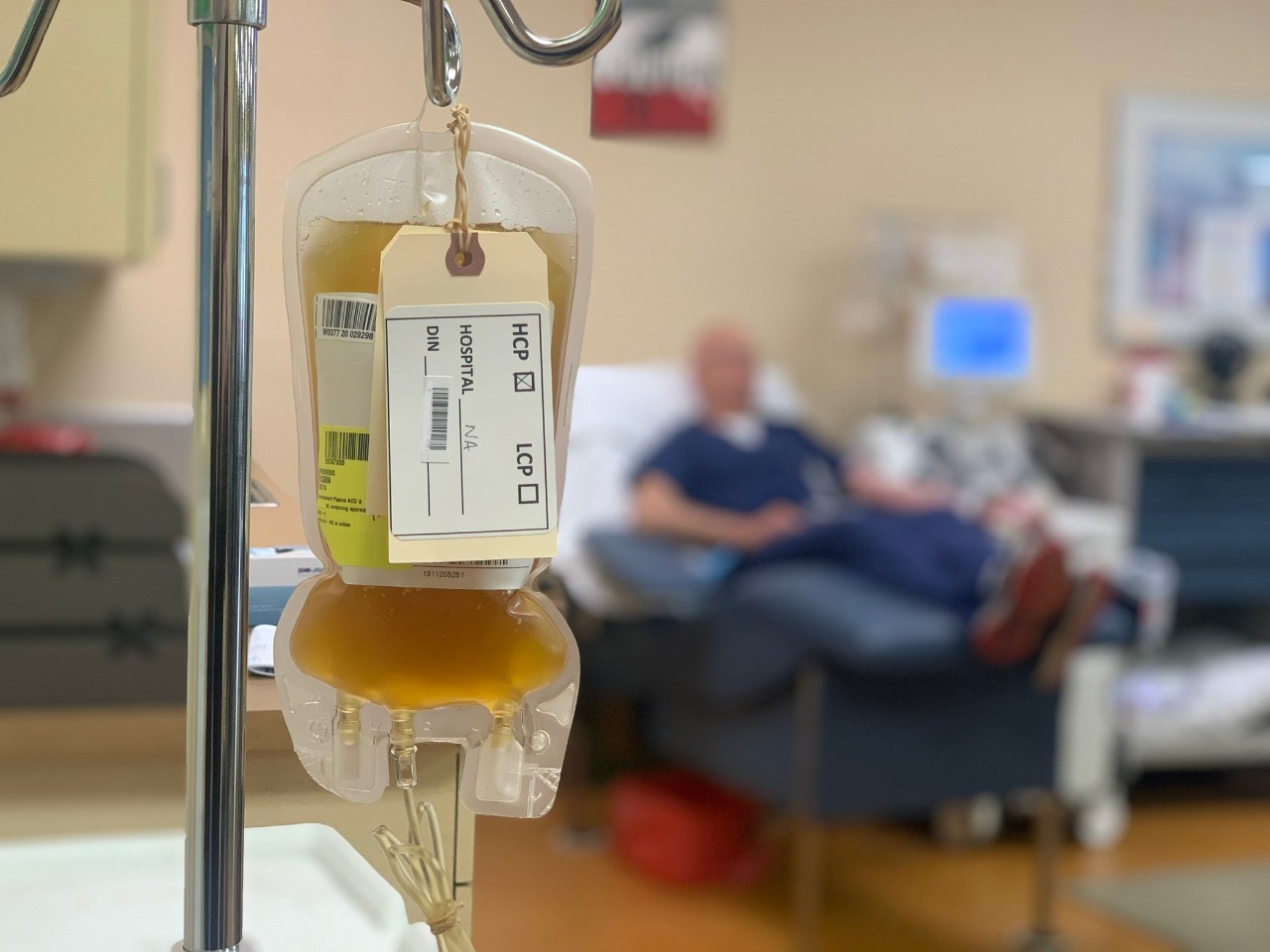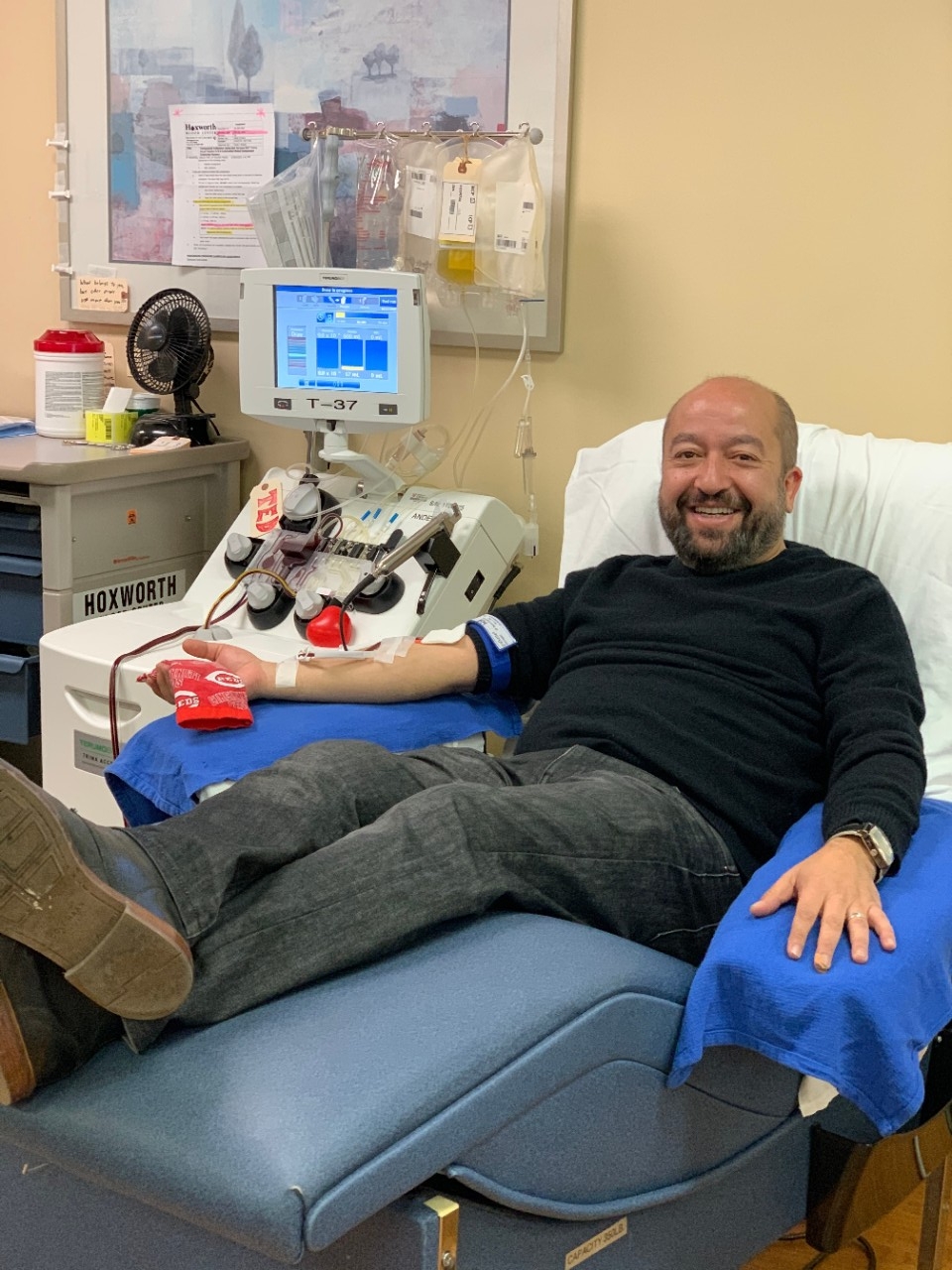
Hoxworth's first convalescent plasma donors
Two individuals rolled up their sleeves to help the most critical COVID-19 patients
The first few months of 2020 have seen the COVID-19 virus spread its tendrils across the globe, bringing with it an atmosphere thick with fear and uncertainty. Thousands of patients nationwide have died or remain in critical condition after being infected; government-mandated shutdowns resulted in shuttered businesses and workers without income, and widespread social-distancing measures have left large swaths of the population feeling isolated, with no end in sight.
But on Friday, April 17, two recovered COVID-19 patients in the Cincinnati area offered a spark of hope in challenging times, just by rolling up their sleeves.
Mohammed Alagha and Dr. Robert Ernst were the first two individuals to donate convalescent plasma that could help the most critical COVID-19 patients in the Tri-State area.
In light of the COVID-19 outbreak, the FDA approved an Emergency Investigational New Drug (EIND) to allow the use of convalescent donor plasma for the treatment of the COVID-19 virus. Convalescent plasma is collected from recovered COVID-19 patients who are found to have developed significant numbers of antibodies in their plasma. Through transfusion, it is the hope that these antibodies will improve the disease fighting response to the virus, acting as a boost to the immune system.

Mohammed Alagha knew immediately that he wanted to do something to help after he was diagnosed with COVID-19 in March. He first fell ill on March 16th, despite taking safety precautions, after traveling internationally for work. “I had been really careful when I was traveling — sanitizer, hand washing. I still got sick,” he said. “It was not like the flu…the symptoms were very different. I had a fever, cough, shortness of breath, and a loss of taste.”
Alagha spent the weeks following his diagnosis doing research on how he could help other patients with the virus. After speaking with several doctors and hospitals, he learned that he could donate his plasma with Hoxworth Blood Center.
Alagha, who lives in Clifton, is not a regular blood donor. “I am the person who is afraid of needles,” he said, but he was determined to help.
“This virus is not a joke. It’s serious,” Alagha said. “This is our duty to do something for our community. If you’ve recovered, you should be coming in to donate.”

Dr. Robert Ernst, a neuroradiologist with UC Health who lives in West Chester, was similarly committed to helping in the wake of his recovery. He believes he contracted COVID-19 in Colorado from an individual who later passed away while battling the virus.
“I was sick for about six or seven days in early March," Ernst recalls. “But I had these unusual symptoms, like loss of taste.”
After receiving a positive antibody test for COVID-19, Ernst contacted Hoxworth to see if his plasma could be used.
“All I know is that there is the potential to help people who are much sicker than I was. These patients are fighting for their lives,” Ernst said. “I think it’s important that we all need to help as much as we can. Anything I can do to help, I’ll do.”
And, he added, donating plasma is not a difficult task. “It’s just one quick stick, and now all I’m doing is laying here!” he said. “I’ll continue to donate once a week for the next three weeks.”
Each unit of donated plasma can be separated and transfused to three or four patients who are battling the virus—so Ernst’s donation could have a huge impact. But he isn’t looking for praise.
"I am thankful that I recovered and my family is healthy," he said. "Anything I can do to help anyone that is struggling with the disease, I am more than happy to help."
Alagha agrees — and while he knows that the convalescent plasma treatment is experimental, he still believes that donating his plasma is his duty. “I just want to help people,” he says. “We know there’s a chance that this could work — and if the patient has no other choice, why not? There’s nothing to lose but just an hour of our time.”
“It’s important that we can do something for our community, he finishes. “It’s not about being nervous, but about us sharing responsibility and doing something to help. It’s so easy. I hope that people seeing me do this makes them feel better.”
Find more details
Impact Lives Here
The University of Cincinnati is leading public urban universities into a new era of innovation and impact. Our faculty, staff and students are saving lives, changing outcomes and bending the future in our city's direction. Next Lives Here.
Stay up on all UC's COVID-19 stories, read more #UCtheGood content, or take a UC virtual visit and begin picturing yourself at an institution that inspires incredible stories.
Related Stories
UC study examines delivery timing in mothers with chronic...
December 19, 2024
In a study recently published in the journal O&G Open, University of Cincinnati College of Medicine physician researchers found 39 weeks of gestation is optimal for delivery in mothers with chronic hypertension.
UC receives $3.75M in federal funding for K-12 mental health...
December 18, 2024
A three-year, $3.75 million grant from the Department of Education aims to address critical gaps in the mental health and educational landscape by providing tuition stipends for UC graduate students majoring in school and mental health counseling, school psychology and social work.
Winter can bring increased risk of stroke
December 18, 2024
The University of Cincinnati's Lauren Menzies joined Fox 19's morning show to discuss risk factors for stroke in the winter and stroke signs to look for.
